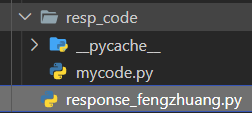本文最后更新于 57 天前,如有失效请评论区留言。
前言
前面我们介绍的 FastApi 响应体都是使用不同的结构体进行的,有 str、list、json 等,但是这在前后台分离的场景下是不友好的。为了方便前端处理,我们一般会使用统一的数据结构作为响应。
分析
针对常用的响应码,我们可以封装符合自己业务需求的结构体。比如自定义响应码,自定义 message 等。
我们可以使用 Python 的字典类型对统一结构体进行组装,然后根据不同的响应码封装不同的方法去实现统一响应。
我们还可以将公共的内容固定下来,作为 base struct 使用。
呆猫
封装响应体
mycode.py
from fastapi import status
from fastapi.responses import JSONResponse
from typing import Union
# 定义响应统一结构体
def resp_200(*, data: Union[list, dict, str]):
'''
200系列的响应结构体
*:代表调用方法时必须传参数
Union:代表传入的参数可以是多种类型
'''
return JSONResponse(
status_code=status.HTTP_200_OK,
content={
'code': 0,
'message': "Success",
'data': data,
}
)
def resp_400(*, data: str, message='Bad Request!'):
'''
400系列的响应结构体
*:代表调用方法时必须传参数
'''
return JSONResponse(
status_code=status.HTTP_400_BAD_REQUEST,
content={
'code': 1,
'message': message,
'data': data,
}
)鉴于文章篇幅长度,我们这里只用
200和400响应体进行演示。
App 中使用
我们在 FastApi 的 App 中将 mycode 导入,即可直接使用。
_response_fengzhuang.py_
from fastapi import FastAPI, Request
from fastapi.responses import RedirectResponse,JSONResponse
import uvicorn
import time
from resp_code import mycode
app = FastAPI()
# 为app增加接口处理耗时的响应头信息
@app.middleware("http")
async def add_process_time_header(request: Request, call_next):
start_time = time.time()
response = await call_next(request)
process_time = time.time() - start_time
# X- 作为前缀代表专有自定义请求头
response.headers["X-Process-Time"] = str(process_time)
return response
@app.get('/{ck}')
async def index(request: Request,ck:int):
#print(request.headers)
if ck < 10:
return mycode.resp_200(data='关注:Python全栈开发')
else:
return mycode.resp_400(data=f'ck的值不对:{ck}')
if __name__ == '__main__':
uvicorn.run(app='response_fengzhuang:app',
host='localhost', port=1331, reload=True)文件结构

如上,当我们访问/9 的时候,后端返回 200 系列结构体,访问/10 的时候,后端返回 400 系列结构体。

如上,
200和400响应体结构都是一致,前端根据code即可处理请求。